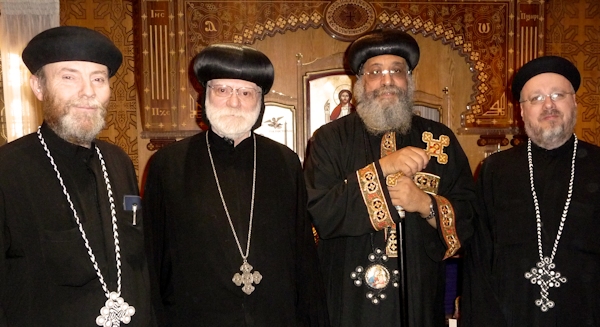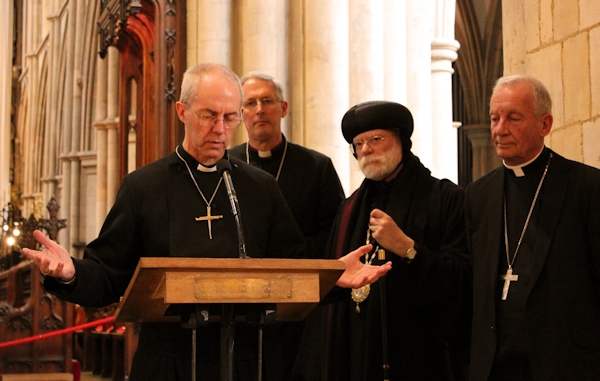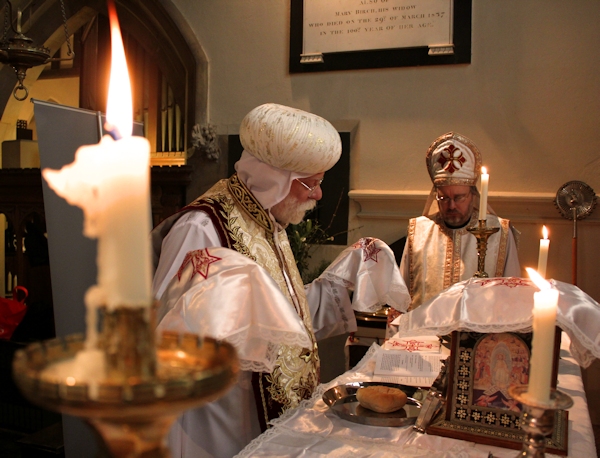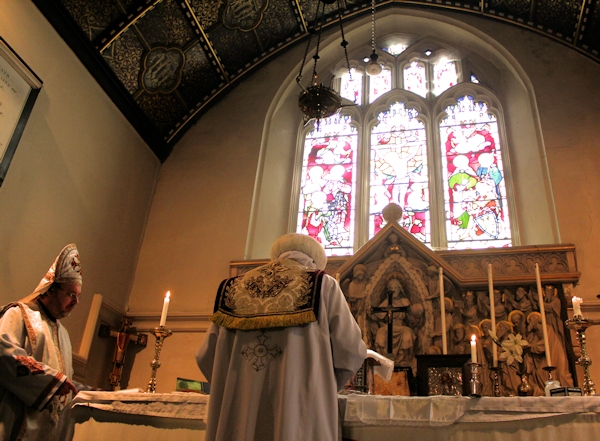Abba Seraphim attends Licensing of Bishop as a Guild Vicar
Abba Seraphim attended Solemn Evensong at the Guild Church of St. Dunstan-in-the-West, London, on 17 April for the ceremony of Licensing the Right Rev’d Jonathan Baker, Suffragen Bishop of Fulham, as Guild Vicar of St. Dunstans. Bishop Baker is a former Principal of Pusey House, who was consecrated as Bishop of Ebbsfleet in 2011 and translated to Fulham in February this year. Presiding at the service was The Bishop of London (The Right Rev’d Richard Chartres), who preached an engaging and inspiring sermon. Among the guests present was His Eminence Metropolitan Iosif, of the Roumanian Orthodox Diocese of Western and Southern Europe, with whom Abba Seraphim discussed the Joint Commission between the Eastern and Oriental Orthodox Churches. A reception followed afterwards at Hoare’s Bank in Fleet Street.
Pray for the Church in Egypt
London Liturgy to pray for the Church in Egypt
On Saturday, 13th April, 9:30 am. His Eminence Metropolitan Seraphim of the British Orthodox Church within the Coptic Orthodox Patriarchate will celebrate the Liturgy and invites all who wish to pray for the peace of Egypt and the safety of the Coptic Orthodox Church to unite with us in prayer.
The Liturgy will take place at St George in the East, Cannon Street Road, Shadwell, London, E1 0BH, beginning at 9:30 am with the Raising of Incense, and at 10:00 am with the Liturgy itself.
All interested and faithful Christians who are able to pray with us on this occasion are most warmly invited to do so.
Our worship will be in the English language.
The Church of St George in the East is only 4 minutes walk from Shadwell DLR station.
Abba Seraphim’s 37th Visit to Egypt

Accompanied by Fathers Simon Smyth and Peter Farrington, Abba Seraphim flew out of London on 25 March and arrived in Cairo in the early hours of 26 March, where he was greeted by Shenouda Mamdouh, Egyptian Secretary to the British Orthodox Church, and taken to St. Mark’s Centre in Nasr City, where they were to stay during this visit. On their flight they had the pleasure of travelling with Father John Sarkis, priest of St. Mary & St. Samuel the Confessor Church in Toronto.
The next morning they were joined by Tina Hammond, a member of the BOC Chatham congregation, her husband Youhanna Said Hakim, and Father Arsanios Amba Boula, who joined Abba Seraphim’s party. Together they drove to Old Cairo where they visit St. George’s Convent and were received by Mother Kyria and visited the shrines and churches of the monastery, before travelling on to St. Theodore’s (Amir Tadros) Convent in Hârat ar-Rûm, where they were warmly received by the Abbess, Mother Adrosios, and the nuns. After leaving the Convent they visited some craftmen in Khan El Khalili. From here they drove to the Old Patriarchate in Ezbekia, where His Grace Bishop Raphael, the newly appointed General Secretary of the Holy Synod, has established his office. Since Pope Shenouda removed the Patriarchate to Abbesseya, the Old Patriarchate has rather fallen into neglect, so it was good to see this historic building restored. Bishop Raphael received all of Abba Seraphim’s party and they discussed a number of common issues and concerns. At the conclusion of the meeting, Bishop Raphael conducted them on a visit to the private rooms and cell of the late Pope Kyrillos VI, which are shortly to be renovated.
On 27 March, Abba Seraphim met with Fr. Seraphim El Souriani, one of the papal secretaries, at the Patriarchate at Abbesseya and, afterwards, His Holiness Pope Tawadros received Abba Seraphim, Fathers Simon and Peter and Shenouda Mamdouh at the Patriarchate, where they reported on the work and ministry of the British Orthodox Church. Following their audience with the Pope, they visited the Coptic Cultural Centre and were received by His Grace Bishop Ermia, who conducted them round the new exhibition of ancient Coptic manuscripts, and afterwards they visited the Library and viewed the collections of the late Bishop Gregorios and Pope Shenouda.
On 28 March Abba Seraphim and his party drove to the Wadi El-Natrun. They first visited St. Bishoy’s Monastery, where they were received by their old friend, Father Arsanios El Anba Bishoy. After praying at the main shrines, they went to pray at the tomb of the late Pope Shenouda. From here they drove the short distance to the Syrian monastery to pray at the church and where they had lunch, before driving out on the Alexandria Road to visit the Anafora Retreat Centre, which has been established by His Grace Bishop Thomas of El Kousseya. Abba Seraphim had visited here in 2002 and 2005 and the progress in the facilities available was impressive. From the moment they arrived everyone experienced the tranquility of this spiritual haven. Bishop Thomas kindly conducted the party around the many facilities and they met and spoke with both staff and visitors present.
On 29 March Abba Seraphim and his companions visited a number of vestment makers, bookshops and craftsmen, before returning to St. Mark’s Centre, where they received a number of friends and visitors. They left a warm, sunny Cairo on the morning of 30 March and returned to a cold London with flurries of snow.
Archbishop Justin’s Journey of Prayer

In preparation for his enthronement on 21 March, the new Archbishop of Canterbury, The Most Rev’d Justin Welby, has been making a ‘Journey of Prayer’ around the Province of Canterbury. On the afternoon of 16 March he visited Southwark Cathedral to meet with the clergy and people of that diocese as well as representatives of other Christian communities, who would be his new ecumenical partners in his new ministry. Although Southwark Cathedral was cheerful and bustling, the emphasis on prayer in its many manifestations was apparent as was a general spirit of welcome and good-will. The Archbishop, Bishop Christopher Chessum of Southwark and his suffragans were scattered around the cathedral and all easily accessible to those who came to greet them and especially to assure the new Archbishop of their prayers. Among these were Mgr. Peter Smith, the Catholic Archbishop of Southwark, and Abba Seraphim, who both greeted him warmly. In his prayers in their presence Archbishop Justin gave thanks for the recent elections of both the Coptic and the Roman Popes. The afternoon concluded with a short evening prayer, which included two Orthodox elements: the Trisagion and the Great Litany.
First Liturgy at Windsor Mission

The first Orthodox Liturgy for the British Orthodox Windsor Mission was held at St. Andrew’s Church, Clewer, on 16 March, through the kind hospitality afforded by the Rev’d Louise Brown and St. Andrew’s PCC. Despite the torrential rain it was well supported and by the end of the Divine Liturgy the sun had come out and the church’s beautiful setting could be better appreciated. At the beginning of the service Abba Seraphim received into Orthodoxy, by baptism and chrismation, Dr. Michael Brenton, who has been a catechumen for several months and serves as the Secretary of the Windsor mission. Father Peter Farrington, under whose ministry the Windsor mission was established, preached the homily.

